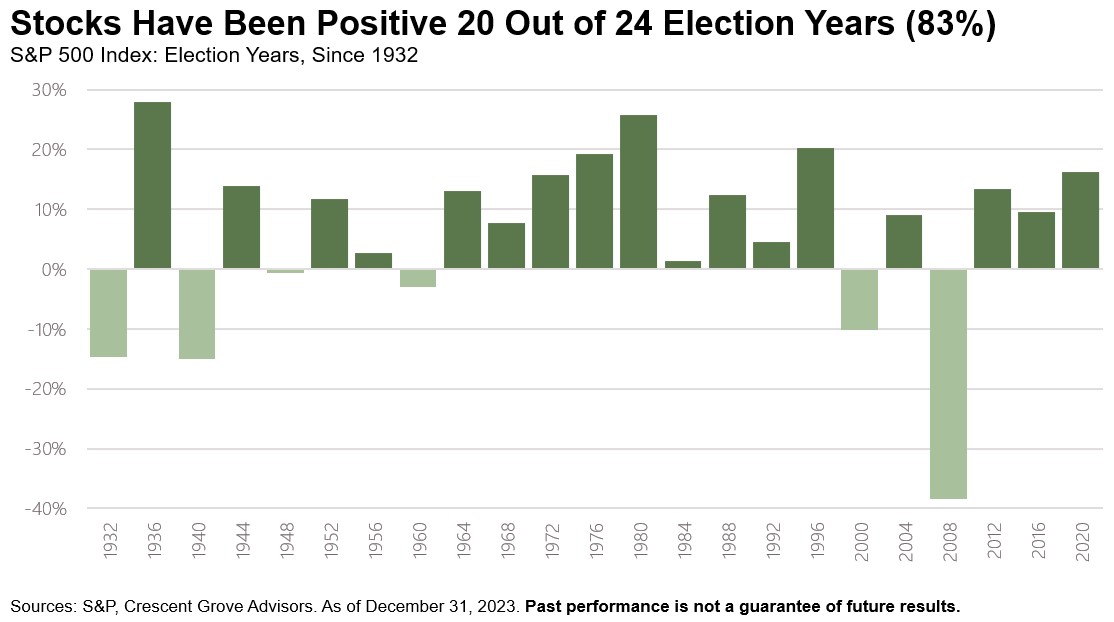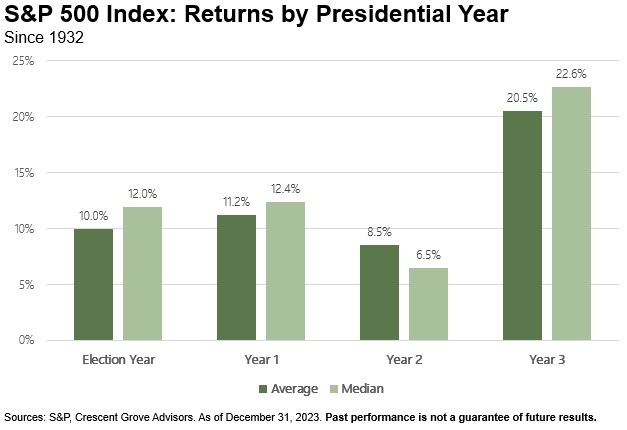Red vs Blue: Staying the Financial Course During an Election
History shows economic uncertainty in presidential election years is often unfounded, as the markets perform well, for the most part, no matter who wins.


Profit and prosper with the best of Kiplinger's advice on investing, taxes, retirement, personal finance and much more. Delivered daily. Enter your email in the box and click Sign Me Up.
You are now subscribed
Your newsletter sign-up was successful
Want to add more newsletters?

Delivered daily
Kiplinger Today
Profit and prosper with the best of Kiplinger's advice on investing, taxes, retirement, personal finance and much more delivered daily. Smart money moves start here.

Sent five days a week
Kiplinger A Step Ahead
Get practical help to make better financial decisions in your everyday life, from spending to savings on top deals.

Delivered daily
Kiplinger Closing Bell
Get today's biggest financial and investing headlines delivered to your inbox every day the U.S. stock market is open.

Sent twice a week
Kiplinger Adviser Intel
Financial pros across the country share best practices and fresh tactics to preserve and grow your wealth.

Delivered weekly
Kiplinger Tax Tips
Trim your federal and state tax bills with practical tax-planning and tax-cutting strategies.

Sent twice a week
Kiplinger Retirement Tips
Your twice-a-week guide to planning and enjoying a financially secure and richly rewarding retirement

Sent bimonthly.
Kiplinger Adviser Angle
Insights for advisers, wealth managers and other financial professionals.

Sent twice a week
Kiplinger Investing Weekly
Your twice-a-week roundup of promising stocks, funds, companies and industries you should consider, ones you should avoid, and why.

Sent weekly for six weeks
Kiplinger Invest for Retirement
Your step-by-step six-part series on how to invest for retirement, from devising a successful strategy to exactly which investments to choose.
As we enter another election season, politics will inevitably occupy a prominent place in consumers’ minds. Presidential campaigns offer a wave of new policy promises and agendas that look to address kitchen-table issues like jobs, taxes and health care.
Presidential elections also feel incredibly consequential, as whoever wins control of the White House will be in charge of the policy agenda for the next four years. Consumers naturally speculate about how election outcomes and policy proposals might affect their household budgets and investment portfolios.
But the truth is that the economy and the markets are much more indifferent to presidential election outcomes than many people believe. Despite the uncertainty, history shows us that investors don’t have to worry too much about how an election result will affect their investments — and keeping this top of mind will help them navigate economic waters during 2024.
From just $107.88 $24.99 for Kiplinger Personal Finance
Become a smarter, better informed investor. Subscribe from just $107.88 $24.99, plus get up to 4 Special Issues

Sign up for Kiplinger’s Free Newsletters
Profit and prosper with the best of expert advice on investing, taxes, retirement, personal finance and more - straight to your e-mail.
Profit and prosper with the best of expert advice - straight to your e-mail.
Investors have been rewarded regardless of who wins the White House
Conventional wisdom suggests one political party is inherently better or worse for investors than another, but historically, stock returns have been strong under both Democratic and Republican presidents. In looking at past returns since 1932, Democratic presidents have seen stocks advance by 8.6% on average, compared to an average of 6.6% under their Republican counterparts.
But these numbers don’t tell the full story. When removing outlier periods from the averages — the boom years under Bill Clinton and the subsequent dot-com bust and global financial crisis under George W. Bush — the difference in returns between parties is practically zero, suggesting investors interpret historical relationships with a healthy skepticism.

Furthermore, the stock market has typically performed well during presidential election years, in spite of all the uncertainty and media chatter. The S&P 500 has delivered positive annual returns in 20 out of 24 presidential election years from 1932 through 2020. During the 24 presidential election years that occurred in that 88-year period, the S&P 500 delivered an average of 10% annual returns during an election year and on average continued to produce positive returns for each of the three years following an election year.

Markets like checks and balances
Contrary to popular belief, the economy and the stock market actually do better when the White House and Congress are controlled by two different parties. According to S&P data, stocks delivered an average of 12.9% annual returns from 1932 through 2023 when Republicans were in charge of both the White House and Congress, and 9% during that time when Democrats were in power of both branches of government.
However, when there has been a Democratic president and a Republican-controlled Congress from 1932 through 2023, the S&P 500 delivered higher annual returns — of 14%. And stocks have delivered average annual returns of 13.6% when there was a Democratic president and control of the House of Representatives and Senate were split.
In other words, political gridlock can actually be good for investors, because it makes it harder to pass sweeping policy changes that could negatively affect the economy.
In addition, the U.S. economy is big and resilient and is dominated by the private sector, meaning the majority of economic activity is outside the direct control of politicians.
Economic fundamentals are what really matter
While it’s easy to attribute stock price action to one party’s politics, the reality is more nuanced, and market performance is not so easily tied to election cycles or political agendas. Political headlines may drive performance narratives in the near term, but over the long term, returns are driven much more by underlying fundamentals.
The path of monetary policy, the ebb-and-flow of the economy and the strength of corporate earnings are all much more important factors than policy decisions emanating from the White House. Ultimately, it’s the economic backdrop, not the political party in control of the White House, that’s more relevant to understanding why stocks go up or down.
Key takeaways
It's natural to be concerned about elections, but history suggests they have minimal impact on portfolios and markets. In the long run, it’s a fool’s game to try to predict how the U.S. economy and markets will respond to election cycles or political outcomes. Instead, consumers should allow their long-term goals and needs to guide their personal finances and investment portfolios.
One of the big advantages of working with a trusted financial adviser is that they can help Americans keep a cool head among all the media and social media chatter. An adviser can work with an individual or a family to create a budget for meeting expenses and saving money over the long term, and also craft a financial plan to save for college tuition and a financially secure retirement.
After these household budgets and financial plans are created, advisers can serve as behavioral coaches to keep individuals and families focused on their long-term goals and calm them down when they are considering financial decisions based on what they are feeling and hearing in the run-up to Election Day in 2024 or in future presidential election years.
Data isn’t emotional. It doesn’t listen to the TV news or monitor social media. And the data says the American economy and stock market are not drastically affected by the outcome of presidential elections — and, in fact, all that uncertainty can be much ado about nothing.
Related Content
- Four Historical Patterns in the Markets for Investors to Know
- What’s the Difference Between Average and Actual Rate of Return?
- To Make the Case for Equities in the Long Term, Look to the Past
- Expecting a 12% Return on Your Portfolio? That’s Dangerous
- Tax Plans of the 2024 Presidential Candidates
Profit and prosper with the best of Kiplinger's advice on investing, taxes, retirement, personal finance and much more. Delivered daily. Enter your email in the box and click Sign Me Up.

Bob is a Senior Wealth Advisor with Crescent Grove Advisors | Portfolio Advisory Services. Specifically, Bob focuses on portfolio advisory services for clients with liquid investable assets of $1 million to $10 million. In addition to portfolio management, Bob works to coordinate his clients’ entire financial plan to address tax planning, cash flow, retirement and risk management.
-
 The Bear Market Protocol: 3 Strategies to Consider in a Down Market
The Bear Market Protocol: 3 Strategies to Consider in a Down MarketThe Bear Market Protocol: 3 Strategies for a Down Market From buying the dip to strategic Roth conversions, there are several ways to use a bear market to your advantage — once you get over the fear factor.
-
 Dow Adds 1,206 Points to Top 50,000: Stock Market Today
Dow Adds 1,206 Points to Top 50,000: Stock Market TodayThe S&P 500 and Nasdaq also had strong finishes to a volatile week, with beaten-down tech stocks outperforming.
-
 Ask the Tax Editor: Federal Income Tax Deductions
Ask the Tax Editor: Federal Income Tax DeductionsAsk the Editor In this week's Ask the Editor Q&A, Joy Taylor answers questions on federal income tax deductions
-
 The Bear Market Protocol: 3 Strategies to Consider in a Down Market
The Bear Market Protocol: 3 Strategies to Consider in a Down MarketThe Bear Market Protocol: 3 Strategies for a Down Market From buying the dip to strategic Roth conversions, there are several ways to use a bear market to your advantage — once you get over the fear factor.
-
 For the 2% Club, the Guardrails Approach and the 4% Rule Do Not Work: Here's What Works Instead
For the 2% Club, the Guardrails Approach and the 4% Rule Do Not Work: Here's What Works InsteadFor retirees with a pension, traditional withdrawal rules could be too restrictive. You need a tailored income plan that is much more flexible and realistic.
-
 Retiring Next Year? Now Is the Time to Start Designing What Your Retirement Will Look Like
Retiring Next Year? Now Is the Time to Start Designing What Your Retirement Will Look LikeThis is when you should be shifting your focus from growing your portfolio to designing an income and tax strategy that aligns your resources with your purpose.
-
 I'm a Financial Planner: This Layered Approach for Your Retirement Money Can Help Lower Your Stress
I'm a Financial Planner: This Layered Approach for Your Retirement Money Can Help Lower Your StressTo be confident about retirement, consider building a safety net by dividing assets into distinct layers and establishing a regular review process. Here's how.
-
 The 4 Estate Planning Documents Every High-Net-Worth Family Needs (Not Just a Will)
The 4 Estate Planning Documents Every High-Net-Worth Family Needs (Not Just a Will)The key to successful estate planning for HNW families isn't just drafting these four documents, but ensuring they're current and immediately accessible.
-
 Love and Legacy: What Couples Rarely Talk About (But Should)
Love and Legacy: What Couples Rarely Talk About (But Should)Couples who talk openly about finances, including estate planning, are more likely to head into retirement joyfully. How can you get the conversation going?
-
 How to Get the Fair Value for Your Shares When You Are in the Minority Vote on a Sale of Substantially All Corporate Assets
How to Get the Fair Value for Your Shares When You Are in the Minority Vote on a Sale of Substantially All Corporate AssetsWhen a sale of substantially all corporate assets is approved by majority vote, shareholders on the losing side of the vote should understand their rights.
-
 How to Add a Pet Trust to Your Estate Plan: Don't Leave Your Best Friend to Chance
How to Add a Pet Trust to Your Estate Plan: Don't Leave Your Best Friend to ChanceAdding a pet trust to your estate plan can ensure your pets are properly looked after when you're no longer able to care for them. This is how to go about it.